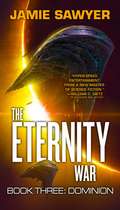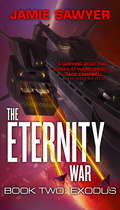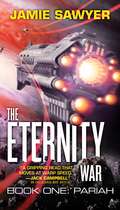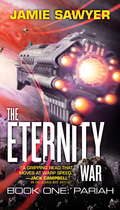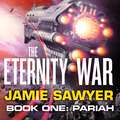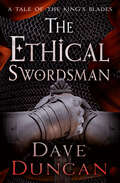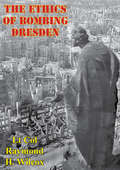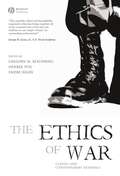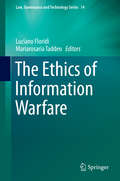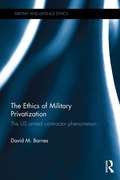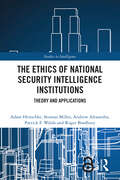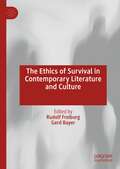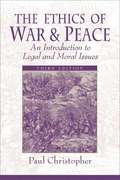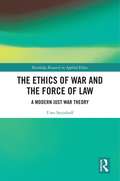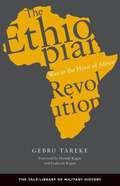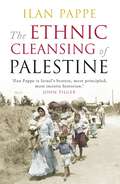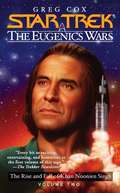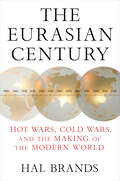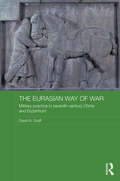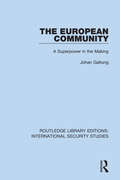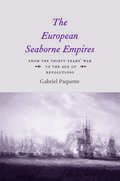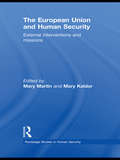- Table View
- List View
The Eternity War: Dominion (The Eternity War #3)
by Jamie SawyerFollowing Pariah and Exodus comes Dominion, the explosive concluding chapter of the Eternity War trilogy, in which the fate of the Alliance-and the galaxy-rests in the hands of Lieutenant Keira Jenkins and her team of Jackals. The Black Spiral terrorist organization and their mysterious leader, Warlord, have unleashed a deadly virus across the Maelstrom. There is nothing that can stop them...except, maybe, Lieutenant Jenkins and her Jackals. Back in Alliance territory with new weapons, new armor, and new bodies, the Jackals are given a secret assignment: to investigate the mysterious Aeon, a potential ally in the escalating conflict, and a force that might shift the gears of war in favor of the Alliance. But there are many agencies interested in the Aeon, and too many sides in this war. Jenkins is going to have to trust her squad, the alien Pariah, and her instincts as she faces the most dangerous decision of her career-one that that will make or break the war once and for all.For more from Jamie Sawyer, check out:The Eternity WarThe Eternity War: PariahThe Eternity War: ExodusThe Eternity War: DominionThe Lazarus WarThe Lazarus War: ArtefactThe Lazarus War: LegionThe Lazarus War: Origins
The Eternity War: Exodus (The Eternity War #2)
by Jamie Sawyer'A NEW MASTER OF SCIENCE FICTION' William C. Dietz, author of the Halo tie-in novels'Jamie Sawyer is easily one of the best military SF writers working today - a must read for anyone who grew up watching Aliens and reading 2000AD' Gavin Smith, author of The Bastard LegionFollowing Pariah comes Exodus, the second book in the Eternity War series - an explosive tale of elite marines, deep-space exploration and warring galactic empires.Lieutenant Keira Jenkins and her Jackals may have survived confrontations with the Black Spiral terrorist network and a betrayal by one of their own. Yet their troubles are only just beginning.With their starship badly damaged, they find themselves adrift in hostile territory. Somehow they must find a way to warn the Alliance before the Black Spiral unleashes a new war across the galaxy.But first they must face the Alliance's oldest enemy: the Asiatic Directorate. And the Directorate has a score to settle with Jenkins . . .Praise for Jamie Sawyer:'A gripping read that moves at warp speed' Jack Campbell, author of the Lost Fleet novels'Alien biomechs . . . terrorism, subterfuge and traitors . . . starships sporting particle beam weapons, railguns the size of skyscrapers, laser batteries, missiles . . . This, dear readers, is the good stuff' Neal Asher, author of the Agent Cormac novels 'Fast-paced and full of action' SFX'Gripping, gritty and unsentimental - Sawyer shows us how perilous future war can be' Michael Cobley, author of Seeds of Earth
The Eternity War: Pariah (The Eternity War #1)
by Jamie SawyerThe first novel in a brand-new series from rising SF star Jamie Sawyer, The Eternity War: Pariah is an action-packed adventure set in the same universe as his acclaimed Lazarus War novels. The soldiers of the Simulant Operations Programme are mankind's elite warriors. Veterans of a thousand battles across a hundred worlds, they undertake suicidal missions to protect humanity from the insidious Krell Empire and the mysterious machine race known as the Shard. Lieutenant Keira Jenkins is an experienced simulant operative and leader of the Jackals, a team of raw recruits keen to taste battle. They soon get their chance when the Black Spiral terrorist network seizes control of a space station.Yet no amount of training could have prepared the Jackals for the deadly conspiracy they soon find themselves drawn into - a conspiracy that is set to spark a furious new war across the galaxy. For more from Jamie Sawyer, check out:The Lazarus War: ArtefactThe Lazarus War: LegionThe Lazarus War: Origins
The Eternity War: Pariah (The Eternity War #1)
by Jamie Sawyer'A NEW MASTER OF SCIENCE FICTION' William C. Dietz, author of the Halo tie-in novels'Jamie Sawyer is easily one of the best military SF writers working today - a must read for anyone who grew up watching Aliens and reading 2000AD' Gavin Smith, author of The Bastard LegionThe Eternity War series is an explosive tale of elite marines, deep-space exploration and warring galactic empires.The soldiers of the Simulant Operations Programme are mankind's elite warriors. Veterans of a thousand battles across a hundred worlds, they undertake suicidal missions to protect humanity from the insidious Krell Empire and the mysterious machine race known as the Shard. Lieutenant Keira Jenkins is an experienced simulant operative and leader of the Jackals, a team of raw recruits keen to taste battle. They soon get their chance when the Black Spiral terrorist network seizes control of a space station. Yet no amount of training could have prepared the Jackals for the deadly conspiracy they soon find themselves drawn into - a conspiracy that is set to spark a furious new war across the galaxy.Set in the same universe as Jamie Sawyer's acclaimed Lazarus War novels, The Eternity War series is an explosive tale of elite marines, deep-space exploration and warring galactic empires.Praise for Jamie Sawyer:'A gripping read that moves at warp speed' Jack Campbell, author of the Lost Fleet series'Alien biomechs . . . terrorism, subterfuge and traitors . . . starships sporting particle beam weapons, railguns the size of skyscrapers, laser batteries, missiles . . . This, dear readers, is the good stuff' Neal Asher, author of the Agent Cormac novels 'Fast-paced and full of action' SFX'Gripping, gritty and unsentimental - Sawyer shows us how perilous future war can be' Michael Cobley, author of Seeds of Earth'An adrenaline shot of rip-roaring military SF' Stephen Deas
The Eternity War: Pariah (The Eternity War #1)
by Jamie Sawyer'A NEW MASTER OF SCIENCE FICTION' William C. Dietz, author of the Halo tie-in novels'Jamie Sawyer is easily one of the best military SF writers working today - a must read for anyone who grew up watching Aliens and reading 2000AD' Gavin Smith, author of The Bastard LegionThe Eternity War series is an explosive tale of elite marines, deep-space exploration and warring galactic empires.The soldiers of the Simulant Operations Programme are mankind's elite warriors. Veterans of a thousand battles across a hundred worlds, they undertake suicidal missions to protect humanity from the insidious Krell Empire and the mysterious machine race known as the Shard. Lieutenant Keira Jenkins is an experienced simulant operative and leader of the Jackals, a team of raw recruits keen to taste battle. They soon get their chance when the Black Spiral terrorist network seizes control of a space station. Yet no amount of training could have prepared the Jackals for the deadly conspiracy they soon find themselves drawn into - a conspiracy that is set to spark a furious new war across the galaxy.Set in the same universe as Jamie Sawyer's acclaimed Lazarus War novels, The Eternity War series is an explosive tale of elite marines, deep-space exploration and warring galactic empires.Praise for Jamie Sawyer:'A gripping read that moves at warp speed' Jack Campbell, author of the Lost Fleet series'Alien biomechs . . . terrorism, subterfuge and traitors . . . starships sporting particle beam weapons, railguns the size of skyscrapers, laser batteries, missiles . . . This, dear readers, is the good stuff' Neal Asher, author of the Agent Cormac novels 'Fast-paced and full of action' SFX'Gripping, gritty and unsentimental - Sawyer shows us how perilous future war can be' Michael Cobley, author of Seeds of Earth'An adrenaline shot of rip-roaring military SF' Stephen Deas
The Eternity War: Pariah (The\eternity War Ser. #1)
by Jamie SawyerThe first novel in a brand-new series from rising SF star Jamie Sawyer, The Eternity War: Pariah is an action-packed adventure set in the same universe as his acclaimed Lazarus War novels. The soldiers of the Simulant Operations Programme are mankind's elite warriors. Veterans of a thousand battles across a hundred worlds, they undertake suicidal missions to protect humanity from the insidious Krell Empire and the mysterious machine race known as the Shard. Lieutenant Keira Jenkins is an experienced simulant operative and leader of the Jackals, a team of raw recruits keen to taste battle. They soon get their chance when the Black Spiral terrorist network seizes control of a space station.Yet no amount of training could have prepared the Jackals for the deadly conspiracy they soon find themselves drawn into - a conspiracy that is set to spark a furious new war across the galaxy.
The Ethical Swordsman (Tales of the King's Blades)
by Dave DuncanIn the final adventure in the King&’s Blades series, one of the Blades is asked to go undercover to hunt down a possible threat to the crown of Chivial. Niall&’s father raised him to be a man of his word, and Niall has tried to live that way throughout his life, even during his training to become a Blade. But things have changed. King Ambrose has died. His daughter, Malinda, is now queen and behaving suspiciously. When she makes Niall Prime of the Blades, he is asked to swear an oath to protect her—and then is made a spy. Now Niall faces a mission that challenges everything he believes and must place his life on the line for a leader he&’s not certain he can trust . . . Praise for Dave Duncan &“Dave Duncan is one of the best writers in the fantasy world today. His writing is clear, vibrant, and full of energy. His action scenes are breathtaking, and his skill at characterization is excellent.&” —Writers Write&“Duncan excels at old-fashioned swashbuckling fantasy, maintaining a delicate balance between breathtaking excitement, romance, and high camp in a genre that is very easy to overdo.&” —RT Book Reviews
The Ethics Of Bombing Dresden
by Lt Col Raymond H. WilcoxThis study describes the events, doctrine, and technical developments of World War II (WWII) that led to the destruction by area bombing of the city of Dresden and the deaths of 135,000 of its citizens. Prior to our entry into WWII our bombing strategy was to employ large numbers of high altitude bombers with heavy defensive firepower, flying in formation, using precision daylight bombardment. This ethical bombing technique was observed early on in WWII, but at some point the ethic changed. Why? Was it a change in the ethics of the commander or country, or was it due to a technological push through the development of on-board radar? This analysis will show that although no specific order or directive specified the destruction of Dresden, those in charge had tacitly endorsed it. History shows us that because of this change, the face of war in Europe also changed. To this day, the firestorm of Dresden remains one of the deadliest and ethically most problematic raids of WWII.
The Ethics Of War: Classic And Contemporary Readings
by Henrik Syse Gregory Reichberg Endre BegbyThe Ethics of War is an indispensable collection of essays addressing issues both timely and age-old about the nature and ethics of war. Features essays by great thinkers from ancient times through to the present day, among them Plato, Augustine, Aquinas, Machiavelli, Grotius, Kant, Russell, and Walzer Examines timely questions such as: When is recourse to arms morally justifiable? What moral constraints should apply to military conduct? How can a lasting peace be achieved? Will appeal to a broad range of readers interested in morality and ethics in war time Includes informative introductions and helpful marginal notes by editors
The Ethics of Information Warfare
by Luciano Floridi Mariarosaria TaddeoThis book offers an overview of the ethical problems posed by Information Warfare, and of the different approaches and methods used to solve them, in order to provide the reader with a better grasp of the ethical conundrums posed by this new form of warfare. The volume is divided into three parts, each comprising four chapters. The first part focuses on issues pertaining to the concept of Information Warfare and the clarifications that need to be made in order to address its ethical implications. The second part collects contributions focusing on Just War Theory and its application to the case of Information Warfare. The third part adopts alternative approaches to Just War Theory for analysing the ethical implications of this phenomenon. Finally, an afterword by Neelie Kroes - Vice President of the European Commission and European Digital Agenda Commissioner - concludes the volume. Her contribution describes the interests and commitments of the European Digital Agenda with respect to research for the development and deployment of robots in various circumstances, including warfare.
The Ethics of Insurgency
by Michael L. GrossAs insurgencies rage, a burning question remains: how should insurgents fight technologically superior state armies? Commentators rarely ask this question because the catchphrase 'we fight by the rules, but they don't' is nearly axiomatic. But truly, are all forms of guerrilla warfare equally reprehensible? Can we think cogently about just guerrilla warfare? May guerrilla tactics such as laying improvised explosive devices (IEDs), assassinating informers, using human shields, seizing prisoners of war, conducting cyber strikes against civilians, manipulating the media, looting resources, or using nonviolence to provoke violence prove acceptable under the changing norms of contemporary warfare? The short answer is 'yes', but modern guerrilla warfare requires a great deal of qualification, explanation, and argumentation before it joins the repertoire of acceptable military behavior. Not all insurgents fight justly, but guerrilla tactics and strategies are also not always the heinous practices that state powers often portray them to be.
The Ethics of Military Privatization: The US Armed Contractor Phenomenon (Military and Defence Ethics)
by David M. BarnesThis book explores the ethical implications of using armed contractors, taking a consequentialist approach to this multidisciplinary debate. While privatization is not a new concept for the US military, the public debate on military privatization is limited to legal, financial, and pragmatic concerns. A critical assessment of the ethical dimensions of military privatization in general is missing. More specifically, in light of the increased reliance upon armed contractors, it must be asked whether it is morally permissible for governments to employ them at all. To this end, this book explores four areas that highlight the ethical implications of using armed contractors: how armed contractors are distinct from soldiers and mercenaries; the commodification of force; the belligerent equality of combatants; and the impact of armed contractors on the professional military. While some take an absolutist position, wanting to bar the use of private military altogether, this book reveals how these absolutist arguments are problematic and highlights that there are circumstances where turning to private force may be the only option. Recognising that outsourcing force will continue, this book thus proposes some changes to account for the problems of commodification, belligerent equality, and the challenge to the military profession. This book will be of interest to students of private security, military studies, ethics, security studies, and IR in general.
The Ethics of National Security Intelligence Institutions: Theory and Applications (Studies in Intelligence)
by Seumas Miller Andrew Alexandra Adam Henschke Patrick F. Walsh Roger BradburyThis book explores the ethics of national security intelligence institutions operating in contemporary liberal democracies.Intelligence collection by agencies such as the CIA, MI6, and Mossad involves practices that are apparently inconsistent with the principles of ordinary morality – practices such as lying, spying, manipulation, and covert action. However, in the defence of national security, such practices may not only be morally permissible, but may also under some circumstances be morally obligatory. One approach to the ethics of national security intelligence activity has been to draw from the just war tradition (so-called ‘just intelligence theory’). This book identifies significant limitations of this approach and offers a new, institutionally based, teleological normative framework. In doing so, it revises some familiar principles designed for application to kinetic wars, such as necessity and proportionality, and invokes some additional ones, such as reciprocity and trust. It goes on to explore the applications of this framework and a revised set of principles for national security intelligence institutions and practices in contemporary and emerging political and technological settings.This book will be of much interest to students of intelligence studies, ethics, security studies and International Relations.
The Ethics of Survival in Contemporary Literature and Culture
by Gerd Bayer Rudolf FreiburgThe Ethics of Survival in Contemporary Literature and Culture delves into the complex problems involved in all attempts to survive. The essays analyze survival in contemporary prose narratives, short stories, poems, dramas, and theoretical texts, but also in films and other modes of cultural practices. Addressing diverse topics such as memory and forgetting in Holocaust narratives, stories of refugees and asylum seekers, and representations of war, the ethical implications involved in survival in texts and media are brought into a transnational critical discussion. The volume will be of potential interest to a wide range of critics working on ethical issues, the body, and the politics of art and literature.
The Ethics of War and Nuclear Deterrence
by James P. SterbaA selection of addresses, essays and lectures on the moral and ethical aspects of war and the strategy of deterrence.
The Ethics of War and Peace: An Introduction to Legal and Moral Issues
by Paul ChristopherThe most important decision that nations make is whether to use force for political objectives. In a democracy, all responsible citizens feel the weight of such decisions.
The Ethics of War and the Force of Law: A Modern Just War Theory (Routledge Research in Applied Ethics)
by Uwe SteinhoffThis book provides a thorough critical overview of the current debate on the ethics of war, as well as a modern just war theory that can give practical action-guidance by recognizing and explaining the moral force of widely accepted law. Traditionalist, Walzerian, and "revisionist" approaches have dominated contemporary debates about the classical jus ad bellum and jus in bello requirements in just war theory. In this book, Uwe Steinhoff corrects widely spread misinterpretations of these competing views and spells out the implications for the ethics of war. His approach is unique in that it complements the usual analysis in terms of self-defense with an emphasis on the importance of other justifications that are often lumped together under the heading of "lesser evil." It also draws on criminal law and legal scholarship, which has been largely ignored by just war theorists. Ultimately, Steinhoff rejects arguments in favor of "moral fundamentalism"— the view that the laws and customs of war must simply follow an immutable morality. In contrast, he argues that widely accepted laws and conventions of war are partly constitutive of the moral rules that apply in a conflict. The Ethics of War and the Force of Law will be of interest to scholars and advanced students working in just war theory, applied ethics, political philosophy, political theory, philosophy of law, and criminal and military law.
The Ethiopian Revolution: War in the Horn of Africa (Yale Library of Military History Series)
by Gebru TarekeRevolution, civil wars, and guerilla warfare wracked Ethiopia during three turbulent decades at the end of the 20th century. Tareke brings to life the leading personalities in the domestic political struggles, strategies of the warring parties, international actors, and key battles.
The Ethnic Cleansing of Palestine
by Ilan PappeThe book that is providing a storm of controversy, from &‘Israel&’s bravest historian&’ (John Pilger)Renowned Israeli historian, Ilan Pappe's groundbreaking work on the formation of the State of Israel. 'Along with the late Edward Said, Ilan Pappe is the most eloquent writer of Palestinian history.' NEW STATESMAN Between 1947 and 1949, over 400 Palestinian villages were deliberately destroyed, civilians were massacred and around a million men, women, and children were expelled from their homes at gunpoint. Denied for almost six decades, had it happened today it could only have been called 'ethnic cleansing'. Decisively debunking the myth that the Palestinian population left of their own accord in the course of this war, Ilan Pappe offers impressive archival evidence to demonstrate that, from its very inception, a central plank in Israel&’s founding ideology was the forcible removal of the indigenous population. Indispensable for anyone interested in the current crisis in the Middle East. *** 'Ilan Pappe is Israel's bravest, most principled, most incisive historian.' JOHN PILGER 'Pappe has opened up an important new line of inquiry into the vast and fateful subject of the Palestinian refugees. His book is rewarding in other ways. It has at times an elegiac, even sentimental, character, recalling the lost, obliterated life of the Palestinian Arabs and imagining or regretting what Pappe believes could have been a better land of Palestine.' TIMES LITERARY SUPPLEMENT 'A major intervention in an argument that will, and must, continue. There's no hope of lasting Middle East peace while the ghosts of 1948 still walk.' INDEPENDENT
The Eugenics Wars: Volume 2 (Star Trek #Vol. 2)
by Greg Cox"A strange, violent period in your history." -- Spock Many unanswered questions remain about the terrible Eugenics Wars that raged on Earth during the 1990s, an apocalyptic conflict that brought civilization to the brink of a new dark age. Centuries later, as Capt. James T. Kirk and the crew of the Starship Enterprise are forced to defend a colony of genetically enhanced humans against Klingon aggression and sabotage, Kirk must probe deeper into the past -- and into the glory days of one of the greatest adversaries he has ever faced. 1992. Almost twenty years ago, Gary Seven and Roberta Lincoln, undercover operatives for an unknown alien civilization, failed to prevent the Chrysalis Project from creating an entire generation of supermen and women, genetically engineered to be stronger, smarter, and more resourceful than ordinary human beings. Now, at last, the children of Chrysalis have grown to adulthood, and are rapidly demonstrating that superior abilities spawn superior ambition. Perhaps the most formidable of this new breed of supermen is the charismatic Khan Noonien Singh. Working behind the scenes of history as head of a vast global conspiracy, Khan's power soon stretches across a quarter of the planet, but that is only the beginning of his grand design. Determined to unite humanity beneath the enlightened rule of a genetic elite, Khan dreams of leading his fellow superhumans to complete and total domination of the world. But several of his gene-engineered brothers and sisters have equally grandiose visions for the future, visions that recognize no one but themselves as supreme ruler. Gary Seven and Roberta watch in horror as the children of Chrysalis wage a covert war against one another, threatening the safety of millions and the future of the entire world! The Eugenics Wars: Volume Two is an earth-shattering thriller that reveals the secret history of the twentieth century -- and the ultimate destiny of the tyrant known as Khan.
The Eurasian Century: Hot Wars, Cold Wars, and the Making of the Modern World
by Hal BrandsOne of Foreign Policy's Most Anticipated Books of 2025 An urgent and incisive new framework for understanding the origins—and stakes—of global conflict with China, Russia, and Iran. We often think of the modern era as the age of American power. In reality, we’re living in a long, violent Eurasian century. That giant, resource-rich landmass possesses the bulk of the global population, industrial might, and potential military power; it touches all four of the great oceans. Eurasia is a strategic prize without equal—which is why the world has been roiled, reshaped, and nearly destroyed by clashes over the supercontinent. Since the early twentieth century, autocratic powers—from Germany under Kaiser Wilhelm II to the Soviet Union—have aspired for dominance by seizing commanding positions in the world’s strategic heartland. Offshore sea powers, namely the United Kingdom and America, have sought to make the world safe for democracy by keeping Eurasia in balance. America’s rivalries with China, Russia, and Iran are the next round in this geopolitical game. If this new authoritarian axis succeeds in enacting a radically revised international order, America and other democracies will be vulnerable and insecure. Hal Brands, a renowned expert on global affairs, argues that a better understanding of Eurasia’s strategic geography can illuminate the contours of rivalry and conflict in today’s world. The Eurasian Century explains how revolutions in technology and warfare, and the rise of toxic ideologies of conquest, made Eurasia the center of twentieth-century geopolitics—with pressing implications for the struggles that will define the twenty-first.
The Eurasian Way of War: Military Practice in Seventh-Century China and Byzantium (Asian States and Empires)
by David A. GraffThis book is a comparative study of military practice in Sui-Tang China and the Byzantine Empire between approximately 600 and 700 CE. It covers all aspects of the military art from weapons and battlefield tactics to logistics, campaign organization, military institutions, and the grand strategy of empire. Whilst not neglecting the many differences between the Chinese and Byzantines, this book highlights the striking similarities in their organizational structures, tactical deployments and above all their extremely cautious approach to warfare. It shows that, contrary to the conventional wisdom positing a straightforward Western way of war and an "Oriental" approach characterized by evasion and trickery, the specifics of Byzantine military practice in the seventh century differed very little from what was known in Tang China. It argues that these similarities cannot be explained by diffusion or shared cultural influences, which were limited, but instead by the need to deal with common problems and confront common enemies, in particular the nomadic peoples of the Eurasian steppes. Overall, this book provides compelling evidence that pragmatic needs may have more influence than deep cultural imperatives in determining a society’s "way of war."
The European Community: A Superpower in the Making (Routledge Library Editions: International Security Studies #7)
by Johan GaltungThis book, first published in 1973, analyses the European Community in a global perspective. It asks and answers two main questions: what does the European Community mean to the masses of the world, and what does it mean to the world community in general? Most critical studies of the EC were made from an internal point of view, and this book is rare in having an external perspective. The author discussed the EC with diverse audiences in 16 countries, and his analyses are invaluable in putting the European project in an international context.
The European Seaborne Empires: From the Thirty Years' War to the Age of Revolutions
by Gabriel PaquetteAn accessible survey of the history of European overseas empires in the seventeenth and eighteenth centuries based on new scholarship In this thematic survey, Gabriel Paquette focuses on the evolution of the Spanish, Portuguese, English, French, and Dutch overseas empires in the seventeenth and eighteenth centuries. He draws on recent advances in the field to examine their development, from efficacious forms of governance to coercive violence. Beginning with a narrative overview of imperial expansion that incorporates recent critiques of older scholarly approaches, Paquette then analyzes the significance of these empires, including their political, economic, and social consequences and legacies. He makes the multifaceted history of Europe’s globe-spanning empires in this crucial period accessible to new readers.
The European Union and Human Security: External Interventions and Missions (Routledge Studies in Human Security)
by Mary Kaldor Mary MartinThis edited book examines European external interventions in human security, in order to illustrate the evolution and nature of the European Union as a global political actor. In 2003, the EU deployed its first external mission under the European Security and Defence Policy (ESDP) with a military force to the former Yugoslav Republic of Macedonia. Since then it has instigated over 18 civilian and military missions to deal with humanitarian crises all over the world. This book presents a series of eight case studies of external interventions by the EU covering the Balkans, Africa, the Middle East, Afghanistan and Indonesia, to illustrate the nature of the EU as a global actor. Using the concept of human security to assess the effectiveness of these missions in meeting the EU’s aim of being a ‘force for good in the world’, this study addresses two key issues: the need for an empirical assessment of EU foreign and security policies based on EU intervention in conflict and post-conflict situations and the idea of 'human security' and how this is applied in European foreign policy. This book will be of great interest to students of European Security, EU politics, human security, post-conflict reconstruction, and IR in general. Mary Kaldor is Co-Director of the Centre for the Study of Global Governance, London School of Economics and Political Science (LSE). Prior to this she worked at Sussex University as Jean Monnet Reader in Contemporary European Studies. Mary Martin is a Research Fellow at the Centre for the Study of Global Governance, the London School of Economics. From 2006-2009 she was co-ordinator of the Human Security Study Group. She was formerly a foreign correspondent and European editor for The Daily Telegraph and Guardian newspapers.
